9-Ф802 Гусева money. Тема Money. Грамматика Present Perfect в активном и пассивном залоге
 Скачать 0.59 Mb. Скачать 0.59 Mb.
|
|
Тема: Money. Грамматика: Present Perfect в активном и пассивном залоге. 1. Изучите слова и перепишите их. Составьте 5 предложений с данными словами. pocket money – карманные деньги much money – много денег little money – мало денег a little money – немного денег price – цена cost – стоить be rich – быть богатым be poor – быть бедным need money – нуждаться в деньгах earn money – зарабатывать деньги spend money on – тратить деньги на make money – делать деньги make a fortune – сколотить состояние save money for – копить деньги на save money on – экономить на ask for money – просить деньги borrow money from smb – занимать деньги у (кого-то) lend smb money – одолжить деньги salary – зарплата banknote – банкнота pound – фунт rouble – рубль euro – евро dollar – доллар coin – монета cash – наличные деньги change – сдача put money into a bank account – положить деньги на банковский счет win / lose money on the lottery – выиграть / проиграть деньги pay in cash – платить наличными pay by credit card – платить кредитной картой ask for a discount – просить скидку currence exchange – обмен валюты exchange euros into pounds – поменять евро на рубли 1. My house burned down, I need money. 2. I need more little money to buy a car. 3. As soon as I arrived in the country I found a currency exchange office. 4. Paying with a credit card is more convenient than paying in cash. 5. I put the money I had left in my bank account. 2. Переведите предложения с русского языка на английский, используя лексику из упр. 1. Мне нужны деньги. - I need money Могу я занять у тебя немного денег? - Могу я занять у тебя немного денег? Джек проигрывает много денег в казино каждую неделю. - Jack loses a lot of money in the casino every week. Я откладывал немного денег с зарплаты (from my salary). - I was saving some money from my salary. Она зарабатывает много денег. - She makes a much money Не давай Джону денег, он их никогда не отдает. - Don't give John money, he never gives it back. Я трачу много денег на одежду. - Я трачу много денег на одежду. Том выиграл 100 фунтов в лотерею (on the lottery). - Tom won 100 pounds in the lottery. 3. Выучите топик. Money in our life (178 words) It is difficult to imagine today’s life without money. Cash and credit cards are the most important things today. Whatever we want or wherever we go, we need money. We need to pay for living, for food, for travel tickets, for the Internet and for many other necessary things. That is why, we always think about money and we need to work for it. Modern technologies have changed the way we use money. You can have no banknote or a coin in the wallet, but most likely there is a plastic card in it, as a kind of payment for goods and services. This is becoming more and more popular today because using a plastic card you can pay your needs in your country and abroad. You don’t have to exchange the currency in order to buy something in a foreign country. You just apply your card and payment is made, no matter what currency you need to pay in. Money is good, but you must remember that you can’t buy health, love or true friends with money! Прочитайте текст 1 и выполните задания. Текст 1 English Banknotes and Coins (247 words) The official currency of the Unites Kingdom is the pound sterling which is equal to one hundred pence. The British do not use the Euro. Although a few of the big shops will accept Euro, it is rarely used across Britain. 5 English banknotes are issued by the Bank of England. As to coins they are minted also by this state bank. The following coins are in circulation: one penny, two pence, five pence, ten pence, 20 pence, 50 pence, 1 pound, and 2 pounds. The singular of pence is "penny". The symbol for the penny is "p"; hence an amount such as 50p is often pronounced "fifty pee" rather than "fifty pence". There are banknotes of the following denominations: £5, £10, £20, £50 and £100. On the face of English banknotes one can read the denomination given both in figures and in words. The inscription on the face of the banknote reads: I promise to pay the bearer on demand the sum of... And then there are two signatures. The first signature is that of the person authorized by the Government and the Bank of England. The second signature is that of the Chief Cashier. The back of English banknotes, like many other banknotes, feature portraits of different famous people. The current £5 note features Elizabeth Fry, who made her name fighting for improved living conditions for women in European jails. The current £10 note features Charles Darwin, the naturalist who developed the theory of evolution. Найдите в тексте 1 ответы на следующие вопросы. 1. What is the official currency of the U.K.? The official currency of the Unites Kingdom is the pound sterling which is equal to one hundred pence. 2. What is the smallest unit? One penny 3. How many pence are there in one pound? 100 pence 4. What banknotes and coins are in circulation in the U.K. now? There are banknotes of the following denominations: £5, £10, £20, £50 and £100. 5. What famous people are featured on the back of various English banknotes? The back of English banknotes, like many other banknotes, feature portraits of different famous people. The current £5 note features Elizabeth Fry, who made her name fighting for improved living conditions for women in European jails. The current £10 note features Charles Darwin, the naturalist who developed the theory of evolution. 4.2 Какие из предложений True or False a. The British use the Euro. F b. The current £ 5 note features Charles Darwin. F c. The pound sterling is equal to one hundred pence. T d. Euro is rarely used across Britain. T e. The back of English banknotes, like many other banknotes, feature places of interest of Great Britain. F 5. Прочитайте и письменно переведите текст 2. Текст 2 Glimpses of History of Money (203words) At different periods of time and in different parts of the world many different commodities have served as money. These commodities were: cattle, sheep, furs, leather, fish, tobacco, tea, salt, shells etc. The experts underline that to serve effectively as money; a commodity should be fairly durable, easily divisible, and portable. None of the above-mentioned commodities possessed all these qualities, and in time they were superseded by precious metals. First they were superseded by silver and later by gold. When a payment was made the metal was first weighed out. The next stage was the cutting of the metal into pieces of definite weight and so coins came into use. Paper money first came into use in the form of receipts given by goldsmiths in exchange for deposits of silver and gold coins. After goldsmiths became bankers their receipts became banknotes. That's how the first banknotes came into existence. At first coins were worth their face value as metal. But later token coins of limited value as legal tender were issued. Now smaller denomination coins are made from bronze and are often referred to as coppers. Bigger denomination coins are made from cupronickel and are usually called silver. ПЕРЕВОД: В разные периоды времени и в разных частях света деньгами служили многие различные товары. Это был: крупный рогатый скот, овцы, меха, кожа, рыба, табак, чай, соль, ракушки и т. д. Эксперты подчеркивают, что для эффективного использования денег товар должен быть достаточно долговечным, легко делимым и портативным. Ни один из вышеперечисленных товаров не обладал всеми этими качествами, и со временем они были вытеснены драгоценными металлами. Сначала они были вытеснены серебром, а затем золотом. Когда производилась оплата, металл сначала взвешивался. Следующим этапом была резка металла на куски определенного веса, и таким образом монеты вошли в употребление. Бумажные деньги впервые вошли в обиход в виде чеков, выдаваемых ювелирами в обмен на вклады серебряных и золотых монет. После того как ювелиры стали банкирами, их расписки превратились в банкноты. Так появились первые банкноты. Поначалу монеты стоили своего номинала, как металл. Но позже жетоны имели ограниченное значение и были выданы в качестве платежного средства. Сейчас монеты меньшего номинала изготавливают из бронзы и часто называют медяками. Монеты большего номинала изготавливаются из мельхиора и обычно называются серебряными. ГРАММАТИКА Present Perfect (Active and Passive) Пройдите по ссылкам ниже, почитайте правила образования Present Perfect и сделайте краткий конспект: https://www.native-english.ru/grammar/present-perfect http://engup.ru/Tenses/Passive_voice/PresentPerfect.html Время Present Perfect обозначает действие, которое завершилось к настоящему моменту или завершено в период настоящего времени. Хотя английские глаголы в Present Perfect обычно переводятся на русский язык в прошедшем времени, следует помнить, что в английском языке эти действия воспринимаются в настоящем времени, так как привязаны к настоящему результатом этого действия.    Время Present Perfect образуется при помощи вспомогательного глагола to have в настоящем времени и причастия прошедшего времени значимого глагола, то есть его «третьей формы». To have в настоящем времени имеет две формы: has – 3 лицо, ед. ч. (He has played) have – 1 и 2 лицо ед.ч. и все формы мн. ч. (I have played) 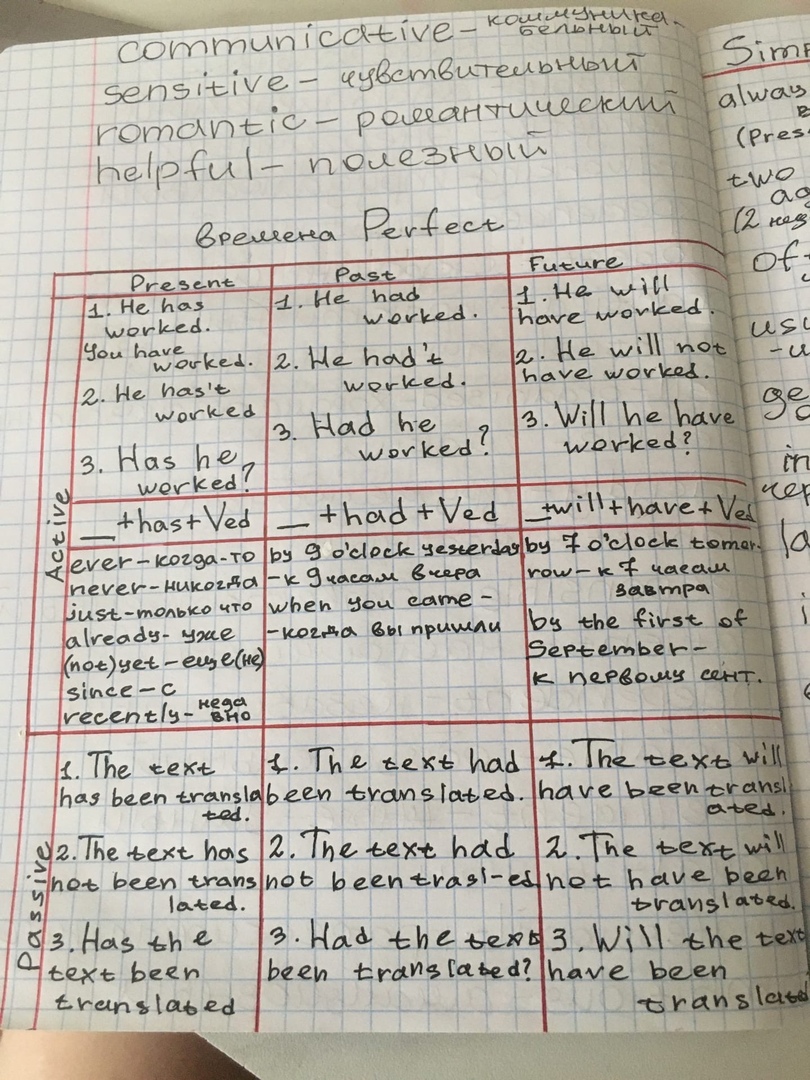 2. Пройдите по ссылке и выполните тест письменно. https://englsecrets.ru/testy/present-perfect-active-passive.html 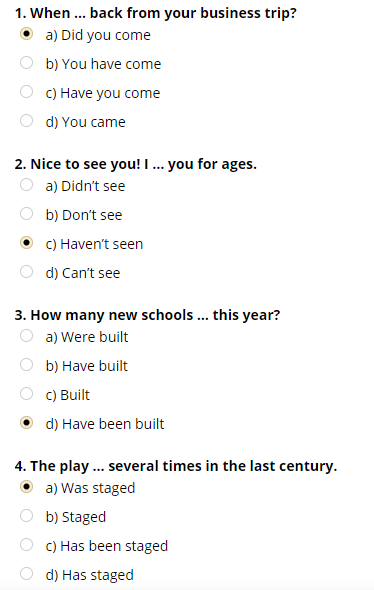 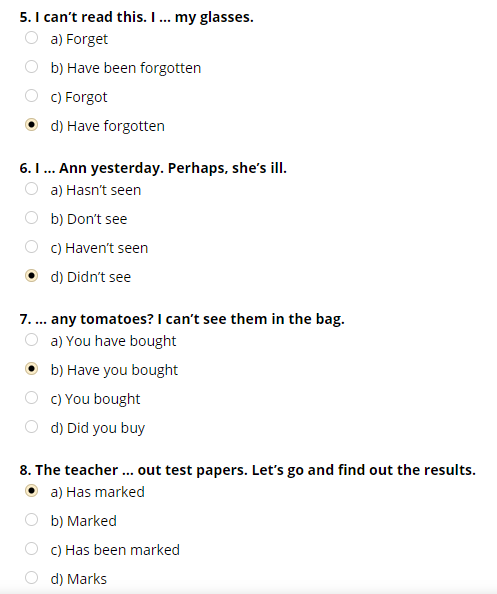 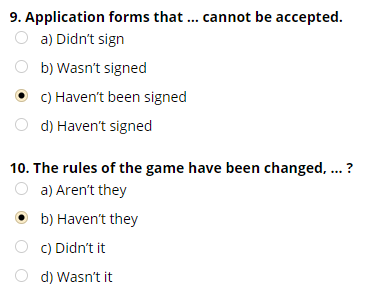 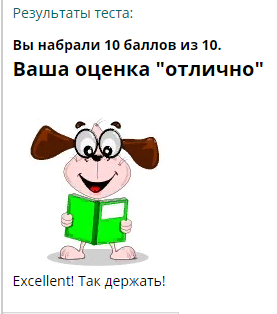 Поставьте глаголы в Present Perfect Active. 1. Richard ………… (write) a good book. 2. Mary ……….. (not get) up yet. 3. Walter and Pat ……….. (finish) their projects. 4. The teacher …………. (not come) today. 5. Hector ………….. (break) his left arm. 6. The driver ……………….. (stop) at the traffic lights. 7. Lucas …………….. (pass) his last exams. 8. Katherine ………….. (meet) him before. 9. The girls …………….. (switch) on the TV. 10. Alexander ………… (have) dinner with me. Перепишите предложения в активном и в пассивном залоге, употребляя указанные глаголы в нужной форме. break disappear go up grow improve Tom is looking for his key. He can’t find it. – Tom has lost his key. Том ищет свой ключ. Он не может найти его. – Том потерял свои ключи. Maria’s English wasn’t very good. Now it is better. Her English_____________ My bag was here, but it isn’t here anymore. My bag________________ Lisa can’t walk and her leg is in plaster. Lisa____________________ Last week the bus fare was £1.80. Now it is £2. The bus fare_____________ Dan didn’t have a beard before. Now he has a beard. Dan____________________ It was raining ten minutes ago. It isn’t raining now. It_____________________ I washed my sweater, and now it’s too small for me. My sweater______________ |
